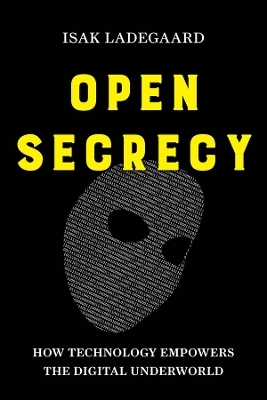
Open Secrecy
How Technology Empowers the Digital Underworld
Seiten
2025
University of California Press (Verlag)
978-0-520-39728-6 (ISBN)
University of California Press (Verlag)
978-0-520-39728-6 (ISBN)
- Noch nicht erschienen (ca. Mai 2025)
- Versandkostenfrei innerhalb Deutschlands
- Auch auf Rechnung
- Verfügbarkeit in der Filiale vor Ort prüfen
- Artikel merken
Uncovering how a diverse digital underground has been liberated by "open secrecy"—and how police crackdowns are making it stronger.
Advances in information technology have made it easier for shadowy groups to organize collective action. Using military-grade encryption, rerouting software, and cryptocurrencies, they move through cyberspace like digital nomads, often with law enforcement and other powerful actors on their tails. This book reveals how the same technology enables these groups to communicate and collaborate in public and semipublic spaces, making them both open and secret at the same time—and efforts to stop these groups provoke countermeasures with unintended, far-reaching consequences.
Isak Ladegaard begins by taking readers inside a digital economy for banned drugs that has survived numerous police crackdowns and is still thriving, nearly fifteen years after its genesis. He then examines how, in roughly the same time period, a community of activist software developers in China and other countries has been able to maintain paths to the open internet, again despite police interventions. Finally, he explains how the American far right uses the same tools to build movements based on paranoia and hate. Timely and perceptive, Open Secrecy helps readers understand how information technology, for better and worse, undermines state control.
Advances in information technology have made it easier for shadowy groups to organize collective action. Using military-grade encryption, rerouting software, and cryptocurrencies, they move through cyberspace like digital nomads, often with law enforcement and other powerful actors on their tails. This book reveals how the same technology enables these groups to communicate and collaborate in public and semipublic spaces, making them both open and secret at the same time—and efforts to stop these groups provoke countermeasures with unintended, far-reaching consequences.
Isak Ladegaard begins by taking readers inside a digital economy for banned drugs that has survived numerous police crackdowns and is still thriving, nearly fifteen years after its genesis. He then examines how, in roughly the same time period, a community of activist software developers in China and other countries has been able to maintain paths to the open internet, again despite police interventions. Finally, he explains how the American far right uses the same tools to build movements based on paranoia and hate. Timely and perceptive, Open Secrecy helps readers understand how information technology, for better and worse, undermines state control.
Isak Ladegaard is Assistant Professor of Sociology at the University of Hong Kong.
| Erscheint lt. Verlag | 20.5.2025 |
|---|---|
| Zusatzinfo | 12 b-w illustrations |
| Verlagsort | Berkerley |
| Sprache | englisch |
| Maße | 152 x 229 mm |
| Themenwelt | Mathematik / Informatik ► Informatik |
| Recht / Steuern ► Strafrecht ► Kriminologie | |
| Sozialwissenschaften ► Kommunikation / Medien ► Medienwissenschaft | |
| Sozialwissenschaften ► Soziologie | |
| ISBN-10 | 0-520-39728-2 / 0520397282 |
| ISBN-13 | 978-0-520-39728-6 / 9780520397286 |
| Zustand | Neuware |
| Informationen gemäß Produktsicherheitsverordnung (GPSR) | |
| Haben Sie eine Frage zum Produkt? |
Mehr entdecken
aus dem Bereich
aus dem Bereich
wie wir unsere Mimik und verborgene Körpersignale entschlüsseln
Buch | Hardcover (2022)
Droemer (Verlag)
20,00 €


